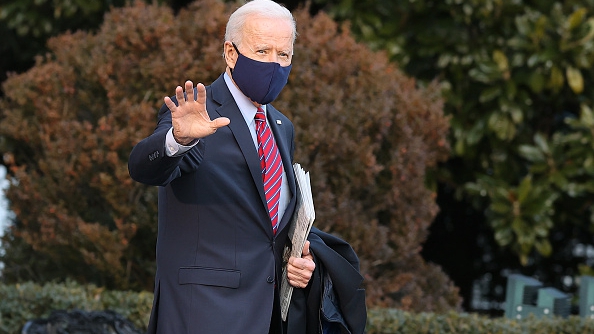
U.S. President Joe Biden walks across the South Lawn as he departs the White House to spend the weekend in Delaware in Washington, DC., on February 05, 2021. /Getty
U.S. President Joe Biden walks across the South Lawn as he departs the White House to spend the weekend in Delaware in Washington, DC., on February 05, 2021. /Getty
Editor's note: Stephen Ndegwa is a Nairobi-based communication expert, lecturer-scholar at the United States International University-Africa, author and international affairs columnist. The article reflects the author's opinions and not necessarily the views of CGTN.
The mixed feelings that greeted U.S. President Joe Biden's inaugural foreign policy address on February 4 have left many foreign affairs experts and international relations analysts unsure of America's foreign policy anchoring.
For the avoidance of doubt, Biden's foreign policy is basically a reflection of America's interests overseas. The issues that he tackled in his speech addressed various hotspots that interfere with the country's strategic geopolitical interests, stressing that there is no difference between foreign and domestic policy – "Every action we take in our conduct abroad, we must take with American working families in mind.”
Foreign policy will be one of Biden's biggest headaches. His speech gave hints of a superpower trying hard to remain relevant in a world that seems to have moved to a post-America era. The president's stress that "America is back" sounded like a war cry to those that might have dismissed the superpower following its compounded misfortunes in 2020.
Biden's attempt at flexing his muscles against Russia on accusations of interfering with the U.S. electoral process, and demanding the release of Russian dissident Alexei Navalny "immediately and without condition" cannot be expected to move Moscow. The opportunity for a more diplomatic approach seems to have been lost even after both countries extended the New Strategic Arms Reduction Treaty for another five years on January 3.
Following up on his recent threats to slap Myanmar with sanctions, Biden called out the new military regime on account of its affront to democracy. But it is unlikely that the new administration will budge on account of such threats. America's dictatorial stance could actually end up compromising its credibility in South East Asia in the likely event that its threats do not achieve the intended outcome.
There can be no major U.S. foreign policy pronouncements that exclude China. While acknowledging that the latter is a worthy competitor, Biden on the other hand could not fail pouring cold water on the emergence of the world's second largest economy as an equal partner that it cannot talk down to anymore.

U.S. President Joe Biden (C) and Vice President Kamala Harris (L) meet with House Democratic leaders, including Speaker of the House Nancy Pelosi (D-CA), and committee chairs to discuss the coronavirus relief legislation in the Oval Office at the White House in Washington, DC. February 5, 2021. /Getty
U.S. President Joe Biden (C) and Vice President Kamala Harris (L) meet with House Democratic leaders, including Speaker of the House Nancy Pelosi (D-CA), and committee chairs to discuss the coronavirus relief legislation in the Oval Office at the White House in Washington, DC. February 5, 2021. /Getty
From the foregoing examples, Biden can be accused of weaponizing democracy by forcing other countries to adopt America's brand of democratic values. He is not averse to real war either, the reason why he said the U.S. will invest in both military hardware and software mainly to defend itself against foreign aggression and identify and prevent attacks. He also stopped the drawdown of American troops in Germany, which shows anticipation of armed conflicts in the future.
Still, Biden requires more empathy than criticism. The work ahead is not enviable, especially because he will have to clean up the mess of his predecessor Donald Trump. This includes revoking cantankerous executive decisions Trump made on climate change, immigration, foreign trade, among others.
Observers were also expecting Biden to talk about the fight against global terrorism and, most of all, the COVID-19 pandemic. The latter is of utmost importance due to its widespread social and economic devastation.
Biden also adeptly sidestepped the Middle East crisis, which basically pits Israel and some of its Islamic neighbors. He did mention the U.S. getting involved in restoring Yemen through restarting peace talks, the reopening of humanitarian corridors, and the withdrawal of the U.S. from combat in the country. Of course, America's soft center for Saudi Arabia, its key ally in the region, came out with promises of protection.
Either by default or by design, Africa seems to have been left out in Biden's scheme of things. His speech mentioned key allies in Europe, Asia, and Oceania. It is really not a surprise, given that Biden's predecessors also generally gave the continent a wide berth, directing the bulk of resources to places it can get more return on its geopolitical investment.
The world is not static and global developments are becoming increasingly fluid. That could be the underlying factor behind Biden's gloved aggression. Changing dynamics require careful treading as the pandemic fundamentally realigned much of the status quo in 2020
Ultimately, Biden needs to make more friends than enemies by removing the bad blood that Trump left behind in his administration's relations with both friend and foe. Further, he must resist the temptation to keep meddling in the internal affairs of other countries and respect their right to exercise self-determination.
(If you want to contribute and have specific expertise, please contact us at opinions@cgtn.com.)

